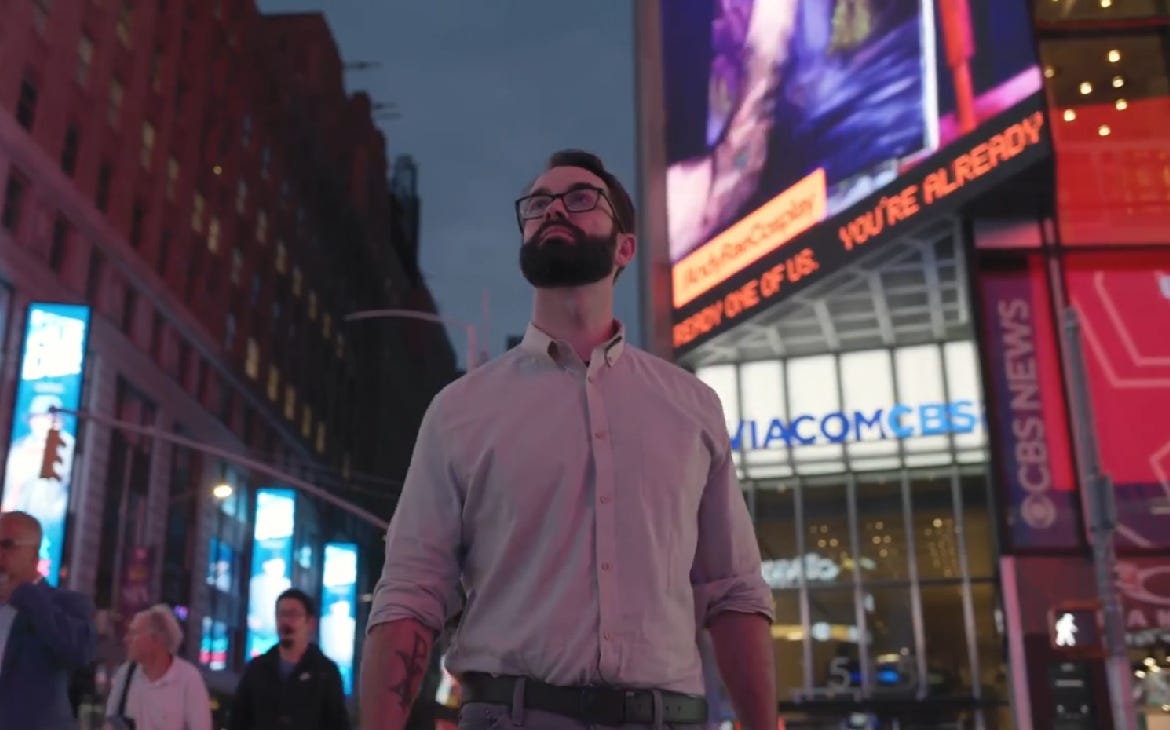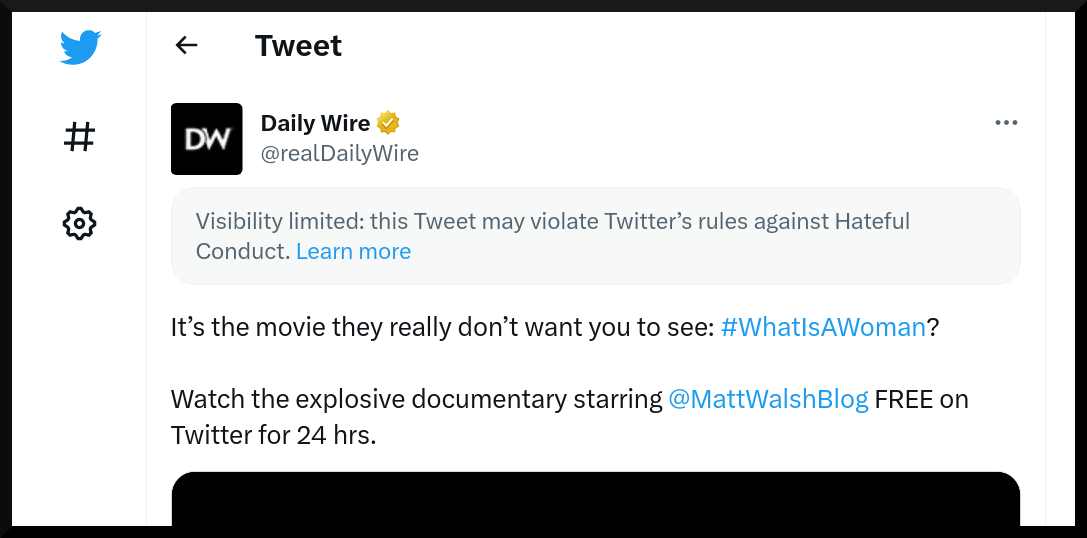Twitter's Throttling Of "What is a Woman?" Was Not Censorship
Censorship on social media depends on how platforms throttle, not what they throttle.
Earlier this month, Twitter “throttled”—did not censor—a controversial documentary by Matt Walsh of The Daily Wire, but chances are it has censored you.
Netizens are right to be concerned about what social media sites throttle. But contrary to popular belief, you do not see the same thing everyone else sees. Platforms often do not tell you when they throttle your content.
This has been true since the dawn of the internet. In order to escape insights from users, platforms stopped informing less-followed accounts of throttling. And to make matters worse, civil society groups who you might expect to call out this behavior instead provide exceptions for it through tough-sounding “principles.”
Secretive throttling satisfies the camps who want to censor our content, but it leaves us in the dark. As a result, we waste time fighting with each other about what platforms throttle. We should instead focus on how they throttle. Does Twitter always allow you to discover the throttling of your own content?
Despite an earlier agreement between Twitter and The Daily Wire, the platform at first limited, then later restored users’ ability to share the film, “What is a Woman?”
Twitter’s actions raised questions. Was this Censorship? Or, did the resulting news and massive viewership cancel out any “censorship” that might have occurred?
A conversation: Censorship on Twitter?
The following day, Seth Dillon, CEO of The Babylon Bee, joined a Spaces conversation to discuss censorship and free speech amidst Twitter’s throttling of the film. Behavioral scientist Caroline Orr Bueno asked, “What is censorship to you?”1
In response, Dillon pointed to his recent interview with Elon Musk in which Musk had said “there’s a massive amount of secret suppression going on at Facebook, Google, Instagram…”
Participants could not agree upon what kinds of content should have free rein. All accepted that government-directed throttling would have constituted censorship; and none argued in favor of a right to post spam, copyrighted materials, or incitements to violence. So what is censorship?
In the era of social media, censorship is not simply defined by whether or not the government is involved. That is, the who question alone no longer provides a clear answer. Consider this novel definition:
Censorship on social media is when the author of a throttled post does not know someone took action against their content.
The crucial point is how platforms throttle content, not what they throttle. It is not censorship when a platform informs authors of their throttled posts. In this post, “throttled” refers to all forms of content moderation including removals and demotions.
Here is how The Daily Wire’s tweet appeared to the public shortly after they posted it:
The gray “Visibility limited” box almost certainly appeared for The Daily Wire’s account. Even if it did not appear for them while logged in, the expectation for this release was so great that they would have immediately found out. Therefore, by the above definition, Twitter’s throttling in this instance was not censorship.
How can that be? Here is a tweet of my own, once visible to me but not others:
This was censorship. Twitter throttled my tweets and hid that from me. I only discovered it because I track and build tools that reveal this behavior on another platform. I reported it and Twitter restored the tweets one week later. Other times, Twitter quietly hides replies behind a button, “Show additional replies, including those that may contain offensive content.”2
Most users do not realize when this happens and thus cannot address it. Even worse, the throttling we do see masks the censorship we do not.
If you still think Twitter’s throttling of Walsh’s film was censorship, we can yet make progress towards free speech online by agreeing on a lesser definition:
The most pernicious censorship on social media occurs when the author of a throttled post does not know someone took action against their content.
Does this really happen so often to be concerned about?
Nearly every social media user has probably written a secretly throttled comment at some point. In my tests, over 50% of Reddit users may have no idea that their accounts reveal recently removed comments.3 The throttling you see is only the tip of the iceberg.
Some argue these are monopolies who control our public square, and that everything they throttle matters. Dillon seemed to make this point when he said, “Private companies have to honor the commitment that they make to users on the platform.”4 Twitter’s Hateful Conduct policy states,
Twitter’s mission is to give everyone the power to create and share ideas and information, and to express their opinions and beliefs without barriers.
“An argument could be made that they're defrauding you,” Dillon added. Presidential candidate Vivek Ramaswamy made a similar point when he suggested “all opinions are fair game.”
Others may argue in favor of secretive throttling. They don’t write hateful things. They just want platforms to throttle other people’s hateful rhetoric by whatever means necessary.
I respond to such propositions with three points:
When platforms hide throttling from authors, the practice is far more widespread.
Prioritizing your own content helps everyone communicate better.
There is another way. Talk about it.
When platforms hide throttling from authors, the practice is far more widespread.
Secretive throttling has no oversight. Neither the author nor the public is aware that someone throttled their content. There are no checks, therefore it happens all the time.
Transparent throttling is fine. People can learn the rules, dispute a rule, or move to other forums. Secretive throttling is like purgatory. There is no learning and no movement.
Today’s online realm runs a real risk of repeating history. Social media is our new public square, and millions of posts may be secretly throttled per day.5 That leads to pockets of tyranny that amalgamate to form larger ones.
Warnings that tyranny could emerge from within society came from 19th-century philosophers Alexis de Tocqueville and John Stuart Mill. They wrote of “tyranny of the majority” and “tyranny of the prevailing opinion.”6 To de Tocqueville, the "germ of tyranny" starts small. Germs also spread easily and need a host. The internet is such a host, but it need not be.
Prioritizing your own content helps everyone communicate better.
Naturally, people want to know what social media sites throttle. Yet they falsely assume they can discover this. As Shireen Mitchell, founder of Stop Online Violence Against Women, put it, “There are plenty of voices that haven't been heard before. You all are not hearing them because they have been soft banned or kept quiet.”7
We do not have a true picture of what platforms throttle. Our understanding relies upon those who have both a big following and dare to say something unpopular. But there are far too few such people to represent all viewpoints.
Further compounding the issue, a platform may choose not to throttle someone with a high profile. Or it may intentionally throttle a high-profile individual’s content in order to amplify it, as some on the call speculated about the “censorship” of Walsh’s film.8
One thing is certain. Focusing on how platforms throttle others is unhelpful. Just like during an in-flight emergency we secure our own oxygen before helping others, we must first secure the integrity of our own content. A truer picture of how platforms throttle others will naturally follow.
There is another way. Talk about it.
You might say that’s impossible. Social media platforms are monopolies and they are doing this secretly. Surely we need the government to step in.
But that would be a mistake. Freedom of speech is a protection from government, not something they provide. Government is neither the source of, nor the solution to the problem, and that is a good thing. If We broke it, We can fix it.
In 2018 when I began building Reveddit, a site that shows users their secretly removed Reddit comments, I was not sure how it would land. Since then, its reception has reaffirmed my belief that applying free speech principles online improves conversations. When people talk about secretive throttling, communities change for the better.
On the Spaces call, the following exchange occurred:
Journalist Brian Krassenstein said shadow banning is “the biggest issue.”9
User Brick_Suit responded, “Yeah I agree I just don't think they've had time to implement that yet. I don't expect them to have that now in this time frame, but I'd like to see them make progress on that as time goes on.”1011
Krassenstein agreed, “Yeah that’s fair.”
If people give excuses, don’t be a pushover. It is never appropriate to misinform the author of a throttled post.
Concerningly, advocates of secretive throttling often find justification for its use in addressing harassment. After the call, Bueno tweeted that harassment is among “the most insidious forms of censorship.” Harassment should be addressed, however, hiding consequences from harassers is not the solution. That would leave us unprepared for offline conversations and contribute to the “manufactured consensus” that Bueno laments in the same tweet. We can instead ask platforms to apply consequences that are visible to authors of violative content.
I am prepared to make the case against secretive throttling with anyone at any time, in any place, and so can you. As President Abraham Lincoln said in closing at his second inaugural address,
With malice toward none; with charity for all; with firmness in the right, as God gives us to see the right, let us strive on to finish the work we are in; to bind up the nation's wounds; to care for him who shall have borne the battle, and for his widow, and his orphan—to do all which may achieve and cherish, a just and lasting peace, among ourselves, and with all nations.12
Let us strive on.
See also:
Senator Josh Hawley’s Manhood, “Theodore Roosevelt once observed that long before ancient Rome became a dictatorship, the Roman republic had ceased to exist, because the hearty Roman yeoman had ceased to be capable of liberty.” See: On the Decadence of Various Peoples, Including the Romans
Dr. Jordan B. Peterson, May 8, 2023: “People think that when you're in a totalitarian state, the reason that the state is totalitarian is because everyone is the victim of top-down pressure from tyrants. And that's not how it works at all. A state becomes totalitarian when every single person is lying about absolutely everything all the time.”
Nadine Strossen, Dec 12, 2019: “[John Stuart Mill’s] whole book, he says at the very beginning, he is not addressing government coercion. [He says] that the greatest danger to free speech and free thought is from social pressure and peer pressure... Anthony Kronman at Yale has a fairly new book [The Assault on American Excellence] in which he stresses that de Tocqueville made this message very strongly. He saw it as the downside of democracy that, yeah, government might not be repressive, but your fellow citizens might well be.”
Elon Musk, Dec 9, 2022: “Twitter is working on a software update that will show your true account status, so you know clearly if you’ve been shadowbanned, the reason why and how to appeal”
President Abraham Lincoln, Second Inaugural Address, March 4, 1865
![[Removed]: The Real Censorship is Secret Suppression](https://substackcdn.com/image/fetch/$s_!4iHc!,w_80,h_80,c_fill,f_auto,q_auto:good,fl_progressive:steep,g_auto/https%3A%2F%2Fsubstack-post-media.s3.amazonaws.com%2Fpublic%2Fimages%2F13b73319-822c-48da-a9ac-1674f4c9a722_127x127.png)
![[Removed]: The Real Censorship is Secret Suppression](https://substackcdn.com/image/fetch/$s_!1X_o!,e_trim:10:white/e_trim:10:transparent/h_72,c_limit,f_auto,q_auto:good,fl_progressive:steep/https%3A%2F%2Fsubstack-post-media.s3.amazonaws.com%2Fpublic%2Fimages%2F4e3bd729-0bba-433a-b935-5a4b52a1ea7b_1278x337.png)





Wow, you came back after that last article, to write this?
Nice cohesiveness!
I am not interested in any talking about what happened to me at my school though.